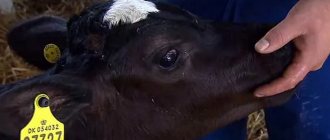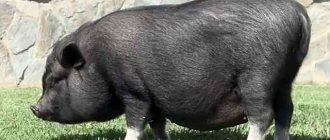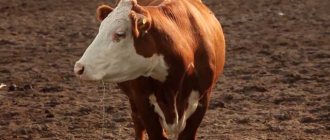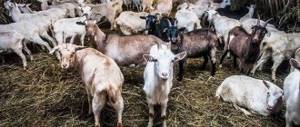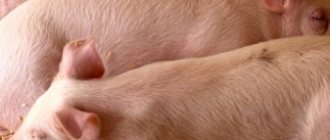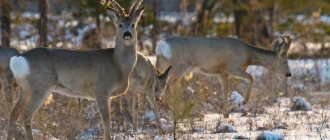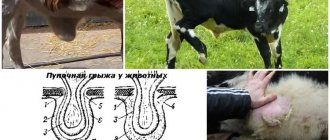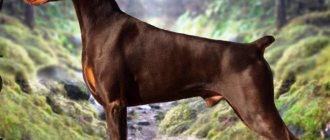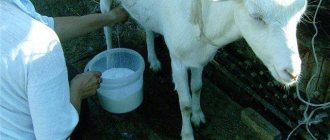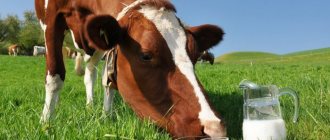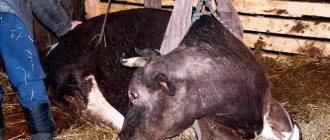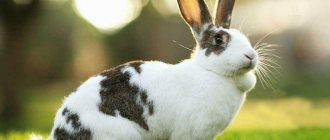Pig teeth: why pigs grind their teeth
Most often, pigs grind their teeth because they have some kind of health problem. Whether it's a sow, a two-quintal boar, or a piglet, if pigs grind their teeth, then something is clearly wrong with them and something needs to be done about it.
Some people simply ignore this squeak, citing the fact that the pig is bored. Oddly enough, but sometimes this works and the boar stops creaking on its own.
The trouble is that squeaking may indicate problems in the digestive system, therefore, it is worth paying attention, first of all, to the pig’s diet.
The reason why pigs grind their teeth may be due to the presence of high levels of fiber in the diet. It is known that it is poorly absorbed, but it is possible to find out whether this is so only by conducting a laboratory study of the artiodactyl.
Another reason may be a change in microelements in the body of these mammals. If this is indeed the case, then in this case it is worth giving the pig clay. This seemingly strange action, if this is really the problem, is quite enough for the pig to stop grinding its teeth.
06:01
Worms in pigs. How and with what to deworm piglets. Pig farming.
07:43
Is it necessary to treat worms in pigs?, How and what can prevent worms in pigs
The most hyped version of why pigs grind their teeth is that they have worms. In any veterinary clinic you can easily get antihelminthic tablets, but it is not a fact that they will help, because the pig is simply not tormented by worms. But the good news is that in order to identify this problem you don’t need to be a genius. If a pig eats a lot and does not grow, or vice versa, does not eat anything, you should go to the veterinarian, otherwise you may be left without a boar.
There is also an opinion that little piglets grind their teeth simply because the pig's teeth are cutting, or they bite teeth that bother them.
Not least of all is any discomfort in the pig's abdomen. In this case, the loss of appetite and inappropriate behavior of the artiodactyl will clearly demonstrate itself. Small piglets tend to lie down or be inactive, while large boars often arch their backs.
If, after taking the steps and contacting the veterinarian, the squeak does not disappear, you should ignore it; maybe the pig has actually found a new pastime.
Ill health as a cause of teeth grinding
Consistent and frequent grinding of teeth usually indicates an unwell pig. The correct diagnosis will be made by a veterinarian after examining the pet and passing the necessary tests. The causes of grinding teeth can be:
Incorrect growth of teeth.
In both cases, the pig requires treatment, dental intervention or other assistance.
Grinding of teeth is always a mess. Of course, isolated manifestations should not cause concern to the owners, but any recurring processes are a reason to sound the alarm. The sooner the problem is solved, the calmer, happier and healthier the pig will be - to the delight of everyone!
Why do piglets grind their teeth and how to treat this disease? In fact, pig diseases are caused by a number of negative factors: changes in the environment, moving, poor diet, wounds, injuries, fractures, infections and helminths. Young animals are especially susceptible and are usually the first to suffer.
Read also: Why spathiphyllum leaves turn black photo
But why do piglets grind their teeth? What exactly could cause this behavior and what to do about it? In fact, if a young animal shows obvious signs of illness, such as fever, rashes, loose and particularly foul-smelling stools, ulcers, absence of stool for a significant period of time, refusal to eat and other serious manifestations of a serious condition, then you should immediately contact a veterinarian.
If the pigs are not lethargic, not painful and eat well, but periodically grind their teeth, then you need to watch them for a while.
Incorrect position of teeth
Why do piglets grind their teeth when they eat? This may occur due to individual teeth being out of alignment or growing too quickly. When eating, young animals experience discomfort, often pain, and try to find a more comfortable position for the jaws. This is where the characteristic creak comes from.
Usually, when this problem occurs, one pig grinds its teeth, while the rest do not stand out in any way. The individual must be caught and its mouth examined: strongly interfering teeth can leave wounds on the internal tissues. If they are not addressed and treated in time, abscesses will occur.
To ensure that young animals wear down their teeth in time and do not suffer from their intensive growth, coal is added to the animals. For the same purpose, chains are hung on adult pigs; they gnaw them and grind off all that is unnecessary.
Diet
Regardless of the age of a pig, be it a young piglet, a boar or a sow, at certain points in their life they may begin to grind their teeth. Sometimes the phenomenon goes away on its own, but most often there are factors that provoke the pathology. Several reasons can be identified that influence this.
One of them may be a violation of the vitamin balance in the body of animals. Particular attention should be paid to microelements, the content of which may change, which will cause this symptom. In this case, there are several ways to help pigs:
- adding regular clay or turf to the diet;
- for a week, multivitamin substances are diluted in drinking water;
- chalk, plaster - can be used as a food additive;
- complete change in feed composition.
Read also: Green food for rabbits
Another cause of bruxism is a digestive problem. This means that the diet is not composed correctly and there is an excess of fiber in the food offered. It is practically not absorbed by the body of a pig or pig. In addition, the animal leads a sedentary lifestyle, and the calories received are not spent on movement. If there is a suspicion of this particular factor, then laboratory tests are carried out, which will show the exact result.
It's boring and creaks
Boredom. The baby has few toys and entertainment, so he looks for his own opportunities to occupy himself with interesting things.
Teeth growth. When new teeth erupt, piglets experience the same discomfort as small children. They strive to chew on everything, constantly put things in their mouths, and study growing teeth using all possible methods. In this case, the creaking is an attempt to realize what is new in the mouth.
A global fight against these problems is not expected, but it is better to keep the pig busy with useful activities during the period of teeth growth. At a minimum, provide him with toys and entertainment to relieve boredom.
Discomfort caused by unbalanced feeds
Why do piglets grind their teeth when given an incorrect and unbalanced diet? This occurs due to tummy discomfort and pain. The young animals are constantly very irritated and this causes them to grind their teeth. Most often, this phenomenon is observed in all individuals located on the same food base.
In severe cases, young animals may develop peptic ulcers, mainly due to the abuse of finely ground and dry feed. Peptic ulcer disease occurs against a background of loss of appetite, a general depressed state, and there are undigested particles and blood in the stool.
Due to the rapid transfer of suckling piglets to an adult diet and a lack of vitamins A and B, the animals develop gastroenteritis.
The pig is grinding its teeth: what is the reason?
Teeth grinding in piglets is mainly due to the following reasons:
- incorrect position of teeth (abnormal bite);
- masticatory muscles have cramps or spasms;
- incorrectly selected diet;
- helminthic infestation.
It is difficult to identify the true cause of teeth grinding without a specialized examination. This is partly due to the fact that piglets often make such sounds out of boredom.
It is possible to decide what to do in such cases only after, in addition to the indicated symptom, other signs of a possible disease appear.
Incorrect position of teeth
This is a common cause of teeth grinding. However, an abnormal bite can only be detected after examining the piglet by a dentist. Monitoring the herd helps to rule out the presence of concomitant diseases that cause young pigs to grind their teeth.
If only one pig makes this sound, this may indicate the presence of an abnormal bite. To diagnose such a deviation, it is necessary to examine the animal's jaw. With an abnormal bite, noticeable indentations or wounds left by the teeth remain on the soft tissues of the mouth. Treatment in such cases is recommended immediately, since without adequate therapy, constant damage to the mucous membrane is fraught with the development of abscesses (suppuration). Moreover, you cannot do anything on your own. A specialized doctor must restore the shape of the teeth.
In order to prevent abnormal bite, it is recommended to give small portions of coal to young animals. For this purpose, adult animals are hung with a metal chain around their neck.
Boredom
Grinding of teeth is typical for compact pens in which a large number of young animals have accumulated in a limited space. Piglets in such conditions become aggressive, which causes fights between animals to become more frequent. The solution to this problem will be to increase the area where young animals live.
See also
The causative agent and symptoms of dysentery in pigs, methods of treatment and preventionRead
Grinding of teeth is also possible when the pig is resting. This sound occurs due to boredom. There is no need to treat animals in such circumstances, provided there are no other abnormal phenomena. That is, therapy is not needed when young animals lead an active lifestyle and eat normally.
Spasms and cramps of the masticatory muscles
When the above reasons for grinding in pigs are excluded, it is necessary to monitor the condition of the piglets. If, while eating or at rest, animals experience uncontrollable twitching of the cheeks, this indicates convulsions or muscle spasms. Such symptoms arise due to neurological disorders or are due to the physiological characteristics of a particular piglet. An animal with such disorders should be shown to a doctor.
Diet mistakes
Teeth grinding is possible due to an improper diet. This phenomenon occurs against the background of pain localized in the abdominal area. Under these conditions, the animal experiences discomfort, which provokes aggression, and, as a result, teeth grinding. Basically, the described phenomenon is typical for piglets whose diet does not change for a long time and contains the same products.
If young animals grind their teeth intensively, this may indicate a gastric ulcer. This pathology provokes severe pain and develops against the background of constant consumption of dry and ground food. In addition to intense grinding, the course of peptic ulcer disease is accompanied by a sharp decrease in appetite, the release of bloody feces and a depressed state of the animal.
In addition to this pathology, an improper diet leads to the development of gastroenteritis. The disease occurs against the background of early transfer of young animals to adult nutrition or a deficiency of vitamins A and group B.
Worms
Teeth grinding is less likely to occur due to helminthic infestation. More often, infection is provoked by:
- weight loss;
- wheezing;
- intense itching from the anus (the animal constantly scratches this area);
- flatulence and diarrhea;
- severe cough after exercise;
- increased nervousness.
See also
Characteristics and description of the Hungarian Mangalica pig breed, maintenance and breedingRead
Treatment for helminthic infestation is selected taking into account the type of helminth.
Worms
Most often, novice breeders are interested in why piglets grind their teeth and grow poorly. The most obvious answer is the presence of worms. On the one hand, modern medical luminaries reject the connection between teeth grinding and helminths in the body. However, if, in addition to the characteristic sound, young animals exhibit symptoms such as weight loss, wheezing, a diligent desire to scratch the anus, gastrointestinal upset (flatulence, diarrhea), nervousness and a long cough during exertion, then most likely these are worms.
This problem can be solved by contacting a veterinarian, who will prescribe the necessary medications and select the correct dosage.
